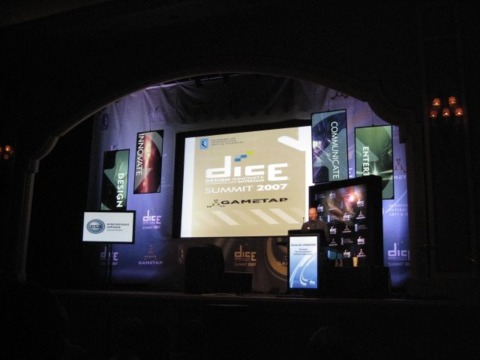D.I.C.E. 07: Lowenstein outro ignites summit
Outgoing ESA pres recalls good times and bad; delivers kudos to those who work to protect the industry, wags finger at those who "cut and run."

LAS VEGAS--In a presentation that was simultaneously reflective, damning, and inspiring, Douglas Lowenstein, the Entertainment Software Association's founding and only president to date, addressed D.I.C.E. Summit attendees this morning in his final public appearance.
He made a point of telling attendees he had prepared no notes and instead sought only to go over an informally generated list of wins he felt the ESA had accomplished since its founding in 1994.
Lowenstein jogged memories by retelling the early days of congressional interest in the game industry. He delved into an anecdote that set up the 1993 congressional hearings that called Nintendo of America's Howard Lincoln and Sega's Bill White to defend the game industry and, specifically, the game Mortal Kombat.
While Lincoln portrayed Nintendo of America as a "socially responsible company," White reached down and picked up a gun peripheral, raising it high above his head and claiming "this is what you use when you are using a Nintendo game system," according to Lowenstein.
The fallout was so severe for the game industry--Lowenstein said the industry was "mortified"--that it prompted the formation of the ESA's precursor, the IDSA (Interactive Digital Software Association).
Lowenstein then proffered a list of what has changed, for the better, over the past 12 and a half years since the ESA was formed. For all the criticism and complaints that have been heaped upon the ESA and its sister organization, the Entertainment Software Ratings Board (ESRB), Lowenstein managed to make the organization's accomplishments sound bold, even Nobel Prize-worthy.
Primarily, he touted the game industry's hard-won perception among government officials and parents. "In 1994, [the industry] had no profile," Lowenstein said. "In the 12 years, we have [built] awareness, and the industry is taken more seriously than it has ever been."
He said the knowledge about, visibility of, and influence of that industry has also changed dramatically in the past dozen years. "We have influence both politically and in other circles. People pay attention to what we say and what we do."
But it was the ESA's work to protect the 1st Amendment rights of game developers, publishers, and retailers that Lowenstein was most proud of. "This is where the rubber hits the road... There is nothing we do that is more important, [as] it's what lets you do what you do best."
Pointing out that the industry is still young, Lowenstein posited that the ESA's proactive stance to protect the constitutional rights of its members was "not important for what is, but for what might be."
He also sought to honor the ESRB and its ratings system. "It is the shield... Without it, we would be taking bullets and not fighting back [effectively.]"
"That part of what we do is central to your ability to create the content you want to create," he said.
But not all is good in the eyes of Doug Lowenstein. For the back third of the 40-minute presentation, he railed like a jilted lover, raising his voice and almost, but never quite, naming those people or companies whose inaction and laissez-faire attitude toward mounting a defense to challenges facing the game industry was doing it great harm and ultimately eroding what the ESA has accomplished.
Admonishing publishers who "make controversial content and then cut and run," he all but mouthed the words Hot Coffee, Grand Theft Auto, and Take-Two Interactive.
”Nothing annoys me more," he said, practically wagging his finger in the direction of the nameless publishers. "If you want to be controversial, don't duck and cover when the s*** hits the fan."
He continued, calling those who don't act a modern-day "Greek chorus" of complainers who chatter among themselves but do little. "You cannot expect the industry to grow if you don't participate--we can't win this war without an army."
Lowenstein closed his presentation by admonishing the game press to rethink its approach to the medium. "It needs to take itself more seriously," he said, chastising the game press for failing to deliver the same level of reporting as coverage that focuses on the film and music industries. A reliance on rumor and sloppy reporting were the elements of press coverage he called out as needing to be rethought and upgraded.
Closing out his talk, Lowenstein encouraged the industry to take more risks and not to rest on the laurels that come only with the implementation of higher levels of technology or the sizzle of new in-game weapons, for example. "Let's not be self-satisfied as an industry."
While this presentation was billed as Lowenstein's last public statement, and his final day as ESA president, he actually helms his last ESA board meeting in Los Angeles tomorrow.
Attendees thanked Lowenstein for his hard work with a standing ovation. And then after taking a few questions and conferring with his longtime ESA colleague Carolyn Rausch, also in attendance at D.I.C.E., he walked down the hall and exited the hotel into the bright lights of a Las Vegas morning, shaking hands and offering some final good-byes to those whose interests he fought hard to protect.
[For a different take on D.I.C.E. 2007, take a look at the GameSpot News Blog, containing interviews with Myst Online's Rand Miller and Lord British himself, NCsoft exec producer Richard Garriott.]
Got a news tip or want to contact us directly? Email news@gamespot.com
Join the conversation